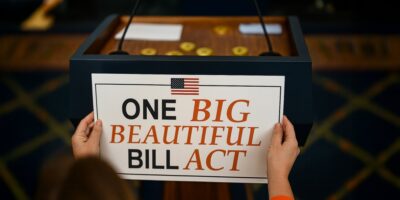Key Takeaways
- Lawmakers Launch Crypto Week from July 14-18, aiming to advance the CLARITY Act, Anti-CBDC Surveillance State Act (Anti-Central Bank Digital Currency), and GENIUS Act towards final approval.
- The Week’s outcome will be crucial in deciding whether the U.S. can lead in crypto regulations or if uncertainty will persist.
- Grand Old Party (GOP) leaders like Mike Johnson, Steve Scalise, and Tom Emmer hail the Crypto Week initiative, stressing that the bills to be discussed are crucial for regulatory clarity.
- Challenges persist as the bills may face opposition from Democrats and some industry groups, potentially delaying or altering the proposed legislation.
Crypto Week Launched To Speed Up The Passage Of Key Bills
The U.S. House of Representatives has officially designated July 14-18 as “Crypto Week,” signaling a milestone for the American cryptocurrency industry. During this week, three important bills will be brought to the floor of the House for debate, discussion, and a potential vote.
The bills include the CLARITY Act, the Anti-CBDC Surveillance State Act (Anti-Central Bank Digital Currency), and the GENIUS Act. If legislated, they will play a crucial role in shaping the regulatory landscape for digital assets in the U.S. and provide much-needed legal certainty for the industry.
House Speaker Mike Johnson, along with Financial Services Committee Chair French Hill and Agriculture Committee Chair GT Thompson, announced the Crypto Week initiative on X. The announcement follows the recent passage of President Donald Trump’s “Big Beautiful Bill” – a policy package aimed at promoting innovation and reducing regulatory barriers in the financial technology sector. “House Republicans are taking decisive steps to deliver the full scope of President Trump’s digital assets and cryptocurrency agenda. During ‘Crypto Week,’ the House looks forward to the timely consideration of three landmark pieces of legislation,” said Johnson.
Three Bills Tackle Major Regulatory Challenges
The GENIUS Act emerges as the centerpiece of the week’s agenda. The Senate approved this stablecoin regulation framework in June with a commanding 68-30 vote, positioning it for final House approval.
The act establishes comprehensive rules for stablecoins and other digital currencies pegged to traditional assets like the U.S. dollar. Regulators, lawmakers, and the crypto industry have described the Act as a critical step to bring stablecoins into mainstream finance.
The CLARITY Act addresses one of crypto’s most contentious issues by defining clear boundaries between digital commodities and securities. House committees advanced the measure with a decisive 47-6 vote last month, signaling strong Republican support. The bill would strip significant regulatory authority from the Securities and Exchange Commission (SEC) for crypto markets, transferring oversight to the Commodity Futures Trading Commission (CFTC) for many digital assets.
The Anti-CBDC Measure May Generate the Most Debate
The Anti-CBDC Surveillance State Act may stand out as the most ideologically charged agenda of the Crypto Week. The House Financial Services Committee approved the bill in April by a 27–22 vote, split strictly along party lines.
This bill, if passed, would permanently prohibit the Federal Reserve from creating a central bank digital currency, reflecting deep conservative skepticism about government-issued digital money. Supporters argue such currencies threaten financial privacy and individual liberty.
Industry Champions Push for Regulatory Certainty
Several prominent lawmakers have expressed full support for the Crypto Week initiative. Tom Emmer, House Majority Whip and a prominent crypto advocate has called the initiative vital to maintaining America’s edge in digital innovation. House Majority Leader Steve Scalise highlighted how the crypto measures align with broader economic goals. “These legislative efforts not only advance the President’s pro-growth agenda but also establish clear regulatory guidelines for digital assets,” he stated.
Issues Persist Despite Unified Republican Front
While Republican leaders express confidence, the bills face varying degrees of challenge as they move through committees and negotiations in both chambers of Congress. Democrats and some industry groups have voiced concerns about certain provisions, meaning bipartisan support is not guaranteed, and the outcomes remain uncertain.
The GENIUS Act appears positioned for quick passage given its Senate approval, but the CLARITY Act continues going through committee review. Former CFTC Chair Tom Massad has criticized the CLARITY Act’s standards as potentially too flexible and impractical for ensuring asset quality.
The Anti-CBDC legislation holds symbolic importance for conservatives concerned about government overreach and privacy. However, many experts see it as addressing a potential future risk instead of a pressing current threat, since central bank digital currencies are not yet widely used.
Experts say that despite differing views, the outcome of the Crypto Week, if positive, could be a defining moment for the U.S. to establish itself as a global leader in crypto regulation. The week’s developments will indeed be a critical test of whether congressional Republicans can deliver on their bold promises to reshape America’s digital asset regulations.
Read more: CLARITY Act Crypto Bill gets Clearance from US Lawmakers



